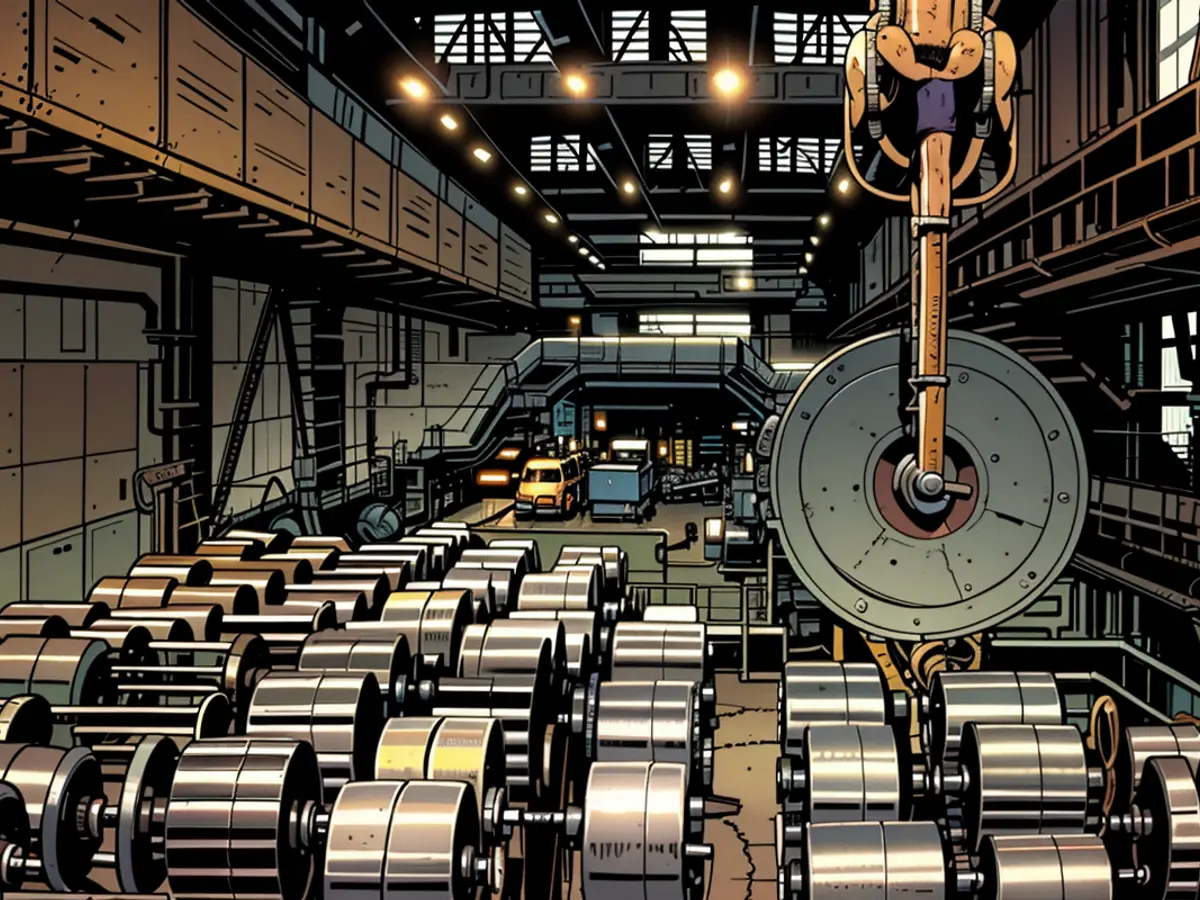Tensions escalate as Government Economy Minister Robert Habeck voices concerns over Thyssenkrupp's precarious state. In a candid interview with the Rheinische Post, Habeck described the situation as intensely tense, stating, "That ain't good news."
Last Thursday, following a supervisory board meeting of Thyssenkrupp Steel, both the chairman and management of the subsidiary announced their sudden departures. Sigmar Gabriel, the supervisory board chair, accused Miguel López, CEO of the main company, of launching an "unheard-of attack" against the steel management in recent weeks.
López publicly criticized the management of the steel sector, Bernhard Osburg, claiming that he needs to devise a long-term, robust, and financially viable blueprint for the subsidiary's realignment. Thyssenkrupp is actively splitting off the struggling steel subsidiary. Osburg and Gabriel were expected to steer this project.
Given the tumultuous state of the steel sector, 20% of the steel subsidiary has already been sold to EPCG, a company owned by Czech billionaire Daniel Kretinsky. A further 30% is planned for transfer to EPCG. There's been much disagreement regarding the amount of financial assistance the division should still receive from the parent company. Union representatives have been warning about potential layoffs due to the upcoming restructuring for months.
Osburg, among other board members of the division, Markus Grolms, and Heike Denecke-Arnold, tendered their resignations on Thursday. Thyssenkrupp Steel announced that the remaining board members, Dennis Grimm, and Philipp Conze, would continue managing the business. "The process for filling the vacant positions will be handled swiftly in the near future," the company declared.
Ali Güzel, chairman of the works council of Thyssenkrupp Steel in Duisburg, admonished López. "This is Essen's management that's led us into this mess," he told WDR. With Osburg, Grolms, and Denecke-Arnold, López has "eliminated" three experts who had an effective plan for the independent future of the steel sector.
Sigmar Gabriel referred to a "flagrant breach of trust" and also accused Siegfried Russwurm, chairman of the supervisory board of the parent company. He complained about cooperating well with the steel management, but it appears that the vision of a successful, independent steel sector is no longer pursued by the powers that be in Essen. "Taking responsible action as supervisory board members becomes impossible under these circumstances."
The state has promised Thyssenkrupp Steel €2 billion for the transition to green steel, but the company must meet its obligations to receive the funds, stated a representative from the Ministry of Economics. The company is required "to contribute its share to ensure that the transformation thrives and sustainable, future-proof steel production is maintained at the German economic location," said Habeck.
In response to Miguel López's criticism of the steel sector management, Sigmar Gabriel, the supervisory board chair, accused him of waging an "unprecedented upheaval" against the managers in the steel sector. Furthermore, Gabriel expressed worry about the consequences of the ongoing restructuring on the steel sector's future, stating that the aspiration of a triumphant, independent steel sector seems to be slipping away in Essen.
Insights:
- Thyssenkrupp's restructuring efforts have been compromised by CE Capital Partners' withdrawal from acquisition discussions for HKM, casting doubt over the facility's future prospects.
- Thyssenkrupp is attempting to divest from its underperforming steel sector, with the HKM facility's age and capacity reductions making its sale a priority.
- Thyssenkrupp's steel division reported a 10% drop in sales in the first quarter of fiscal 2024-25, primarily due to the decline in spot-market prices across all customer segments.
- Thyssenkrupp's green transformation plans include the construction of a DRI plant capable of producing 2.5 million tons per year and the supply of CO2-reduced bluemint Steel to Volkswagen.
- Thyssenkrupp's restructuring initiatives involve cutting around 5,000 jobs at Steel Europe and outsourcing an additional 6,000 positions by 2030.
Implications for the Future of the Steel Industry in Germany:
- Market instability and potential job losses may result from the ongoing restructuring and possible closure of underperforming facilities like HKM, affecting local communities and the broader steel industry in Germany.
- Thyssenkrupp's commitment to the green transformation could lead to more environmentally sustainable practices, reducing the industry's carbon footprint.
- Global trade frictions, such as tariffs imposed by the US, could further pressurize the European steel market, potentially leading to increased price pressure in Europe.
- The steel industry in Germany will need to adapt to technological advancements and environmental regulations, whilst maintaining a competitive edge in this changing landscape.







